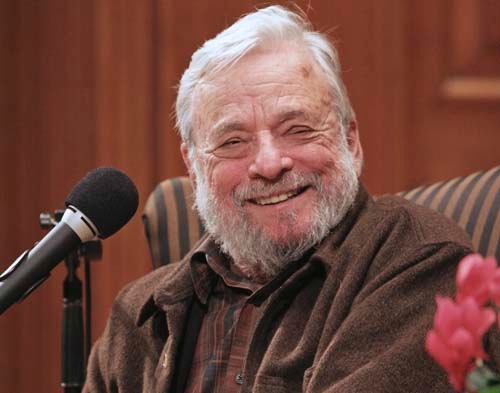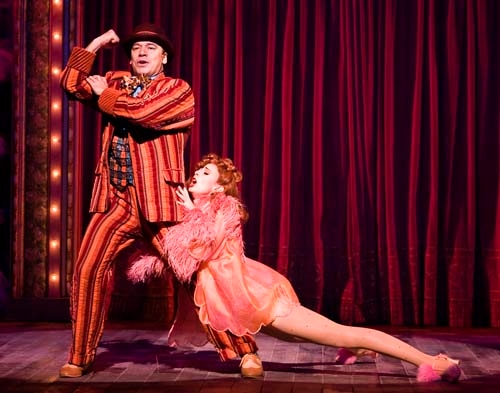Broadway legend Stephen Sondheim to share reflections on storied career



Don’t ask Stephen Sondheim what he’s going to talk about Saturday night at The Smith Center.
He doesn’t know. And he doesn’t want to know.
"I like to be as ignorant as possible for what’s going to happen," says Sondheim, who’s probably the only person in the world who would ever apply the word "ignorant" to anything related to him.
After all, he’s been a major force on Broadway since his 1957 debut as composer Leonard Bernstein’s "West Side Story" lyricist.
His follow-up assignment: writing lyrics for composer Jule Styne (and star Ethel Merman) in another landmark musical, 1959’s "Gypsy."
Sondheim finally took his Broadway bow as both composer and lyricist with 1962’s Tony-winning "A Funny Thing Happened on the Way to the Forum."
And the rest is showbiz history, as Sondheim’s works of the ’70s and ’80s transformed, and expanded, the notion of what a Broadway musical could be.
Venturing far beyond gotta-sing, gotta-dance cliches, Sondheim explored everything from the creative process (in 1984’s Pulitzer Prize-winning "Sunday in the Park With George," about impressionist painter Georges Seurat) to the minds of notorious killers (from 1979’s "Sweeney Todd" to 1990’s "Assassins"). "Pacific Overtures" (1976) focused on the 19th-century collision between traditional Japan and on-the-move America; "Into the Woods" (1987) sent its fairy-tale characters on adventures not necessarily destined to end happily ever after.
And always, Sondheim addressed the elusive, sometimes illusive search for love, from bachelor Bobby contemplating his "good and crazy married friends" in 1970’s "Company," the older (but no wiser) characters of 1971’s "Follies" revisiting their foolishly youthful selves or the change-partners roundelays of 1973’s "A Little Night Music." (To cite three consecutive Sondheim triumphs.)
For those who keep track of such things, Sondheim has won seven Tonys for his musical scores, plus one for lifetime achievement, along with eight Grammys (one for "Send in the Clowns" as Song of the Year), a Pulitzer Prize and an Oscar for his "Dick Tracy" song "Sooner or Later."
A Kennedy Center honoree and a recipient of the National Medal of Arts, Sondheim spent much of 2010 acknowledging his 80th birthday at musical tributes from New York to London, including an all-star concert later telecast on PBS’ "Great Performances."
And two volumes of his collected lyrics – 2010’s "Finishing the Hat" and 2011’s "Look, I Made a Hat" – not only showcase Sondheim’s dazzling wordplay and piercing psychological insights but deliver vivid backstage tales as well. (Sondheim even plays critic, assessing legendary predecessors from Irving Berlin to Ira Gershwin, some of whom fail to meet his lofty standards.)
Clearly, Sondheim, now 82, has plenty to discuss after spending "A Life in the Theater," to cite the formal title of Saturday’s presentation.
Though it’s almost impossible to imagine, Sondheim says he initially contemplated a life not in the theater but in mathematics – that is, until a college professor’s music class inspired him to change course.
Saturday’s Reynolds Hall program includes far more than Sondheim’s comments, however.
Billed as "An Evening of Music and Conversation," the program combines the composer’s remarks – sparked by questions from Michael Kerker , musical theater director for ASCAP (the American Society of Composers, Authors and Publishers) – with selected Sondheim songs, performed by Tony-winning Broadway veterans Brian Stokes Mitchell and Christine Ebersole. (Among the Sondheim classics they’ll perform: "Finishing the Hat" from "Sunday in the Park With George" and "Losing My Mind" from "Follies.")
The words-and-music blend represents a new format for Sondheim, who previously hit the road with columnist (and former New York Times theater critic) Frank Rich for a series of chats.
"I had a good time," Sondheim says of those sessions, describing the process as "something that’s really fun to do," especially "with somebody intelligent interviewing you."
But "this is my first time with ASCAP," adds Sondheim, telephoning from his Connecticut home. And "I’m definitely trying to keep it tabula rasa."
Kerker characterizes the program as "not quite a concert" and "not quite an onstage conversation," describing it as "a 90-minute hybrid."
Although this is his first collaboration with Sondheim, Kerker says the setup follows a series of "Broadway Up Close and Personal" conversations featuring such legendary musical creators as Jerry Herman ("Hello, Dolly!") and Sheldon Harnick ("Fiddler on the Roof") at the Kennedy Center in Washington, D.C.
In Kerker’s view, "for the audience, it’s really interesting" to see and hear performances of selected songs and watch the composer watching the performers, who in turn are watching the composer’s reaction.
"Everything gets heightened," Kerker explains, noting that "phenomenal performers" such as Mitchell and Ebersole find "something extra when the songwriter is sitting right there."
And Sondheim’s not just any songwriter.
"There’s no question that his lyrics have such depth," Kerker says. "They’re almost little three-act plays in themselves."
Yet focusing solely on Sondheim’s gifts as a lyricist, he argues, detracts from Sondheim’s equally masterful music, which "lifts those lyrics" into "the stratosphere."
Even so, Sondheim says, "the kind of shows I write are not sort of mainstream." (To quote "Putting It Together" from "Sunday in the Park With George," art isn’t easy.)
These days, Sondheim says, it’s "discouraging" to note the popularity of "cookie-cutter shows" engineered solely as crowd-pleasers.
Then again, "throughout recorded history, when people reach middle age," the arrival of "a whole new generation, with a whole new way of thinking," triggers inevitable nostalgia, Sondheim suggests, "and people lament how things have deteriorated."
So much has changed in the theatrical world that Sondheim’s most recent show – known as "Wise Guys," then "Bounce" and finally "Road Show" as it hit the road from 2003 to 2008 – never made it to Broadway at all.
"Anything you write, you want people to enjoy," Sondheim says. And while "it’s dismaying when people don’t share your enthusiasm" for a particular project, "that’s part and parcel of what making art is about."
Happily for anyone who loves musical theater, Sondheim’s still making art.
As a result, "I’m going to be doing a lot less of" conversations such as the one at The Smith Center on Saturday, "because I’m trying to write something."
And when Sondheim writes something, it’s really something.
Contact reporter Carol Cling at ccling@reviewjournal.com or 702-383-0272.
PreviewWhat: "Stephen Sondheim, A Life in the Theater"
When: 8 p.m. Saturday
Where: Reynolds Hall, The Smith Center for the Performing Arts, 361 Symphony Park Ave.
Tickets: $29-$85 (749-2000, thesmithcenter.com)












